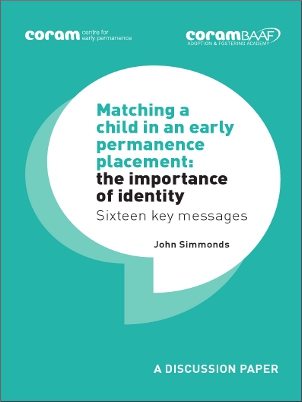
Matching a child in an early permanence placement: the importance of identity
Sixteen key messages
£5.95
The matching of a child’s ethnicity, culture, religion and language with those of their prospective adopters has been a longstanding and challenging set of policy and practice questions. This discussion paper addresses this challenge by focusing on 16 key messages, inviting the reader to reflect on the importance of a child’s identity development over time and then into adulthood.
The 16 messages stimulate a considered exploration of the challenge in evaluating, at the point of the match, those factors that might encourage a positive and confident sense of the child’s identity. This includes the significance of the adopters having the motivation, commitment and skills to proactively co-create a life story narrative with the child that forms the basis for an identity that includes their history and heritage.
Thoughtful and child-centred in its approach, the messages contained in this discussion paper add and reinforce an important perspective – that the development of a child’s identity is core to who they are and who they will become, who they are seen to be, and how they play their part in the relational world around them.
This resource will be of interest to all adoption and fostering managers and practitioners involved in the process of matching children in care.
AVAILABLE IN EBOOK AND HARD COPY
Questions about eBooks? Check out our FAQs
